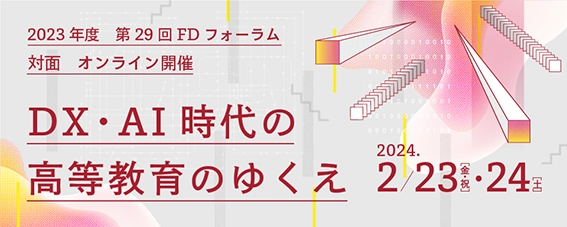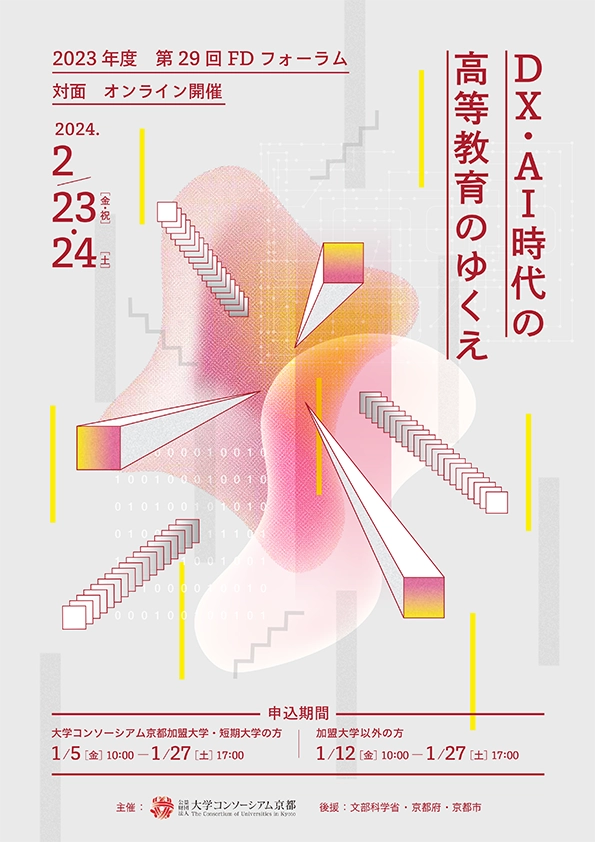Business Overview
Since 1995, the University Consortium Kyoto has been holding an FD Forum every year with the themes of (1) disseminating FD activities, (2) providing practical and research reports on university education and class improvement, and providing a place for personal exchange, with the aim of raising awareness of FD among university faculty and staff and contributing to the improvement of university education. This is a large-scale FD event attended by many university faculty members and educators from all over the country.
Outline of the event
The 29th FD Forum

- Main
- The Future of Higher Education in the Age of DX and AI
- Date & Time
- Friday, February 23, 2024 and Saturday, February 24, 2024
- Venue
- Campus Plaza Kyoto or online (Zoom)
- Organizer
- University Consortium Kyoto
The 29th FD Forum leaflet can be downloaded from here

schedule
| schedule | time | substance |
|---|---|---|
| Friday, February 23 | 10:00~12:00 | Session 1 ~ Session 4 |
| 14:00~16:00 | symposium | |
| 16:30~18:00 | Poster Session * Information exchange meeting will be held at the same venue (~18:30) |
|
| Saturday, February 24 | 10:00~12:00 | Session 5 ~ Session 8 |
| 14:00~16:00 | Session 9~Session 12 |
symposium
Details of the symposium can be found here.
|
symposium
Friday, February 23 14:00~16:00
|
|
Gazing at the Learning Continuum
~In search of resistance and irreplaceability of generative AI~ Capacity: Face-to-face: 230 (priority capacity for member schools: 140 people)
Online: 1,000 students (Priority capacity for member schools: 600 students)
|
In 1995, when a paper by Barr and Tagg pointing to a paradigm shift from teaching to learning was published, the University Consortium Kyoto held its first FD Forum based on “The Art of Knowledge” by the University of Tokyo Press. About 30 years have passed since then, and with the rise of generative AI, it is necessary to re-examine the nature of learning spaces. Focusing on several continuities in learning communities, such as junior colleges and four-year universities, from primary and secondary education to higher education, liberal arts education and specialized education, undergraduate and graduate schools, and universities and regions, we will approach the image of a leader in a place of learning that cannot be replaced by AI, while having AI tolerance from the perspective of generative AI and symbiosis.
|
Breakout Sessions
An overview of all the subcommittees can be found here.
* You can apply for multiple subcommittees, but you cannot apply for subcommittees that overlap with each other.
*If you are participating online, please be sure to check the “Online Participation Supplement” in the outline of each subcommittee in the leaflet.
Poster Session
We will present the initiatives implemented by faculty members and students of the University Consortium Kyoto in relation to distinctive education.
Poster sessions will be held in-person only.
The outline of the presentation poster will be updated from time to time.
Information (business card) exchange meeting
Date: February 23 (Fri) 16:30~18:30
Information (business card) exchange will be held at the same venue as the poster session. Anyone who has registered for the symposium or breakout session is welcome to participate. You do not need to apply in advance. Please feel free to join us.
Implementation Report
The 29th FD Forum Report [Click here for details]
The 29th FD Forum was held for two days on Friday, February 23 and Saturday, February 24, 2024, with the main theme of “The Future of Higher Education in the Age of DX and AI,” both face-to-face and online.
The FD Forum, hosted by the Consortium of Universities in Kyoto, has been held since 1995 with the aim of improving the quality of higher education and disseminating information on FD activities from Kyoto, and this year marks the 29th time.
In this article, we will raise the issue of the importance of relearning DX experiences such as the development of online classes in the Corona disaster, and how to design a learning environment that ensures the continuity of learning places (universities and regions), types of schools (primary, secondary, and higher education, junior colleges and universities, undergraduates, masters, doctorates, etc.). The efforts and practices of each university were reported.
Over the course of the two days, 12 breakout sessions, symposiums, poster presentations, and information exchange sessions were held on a variety of topics.
A total of 468 university faculty members and educators from all over Japan gathered to share results and practices, and to exchange opinions actively.
In the poster session held on the first day, a total of nine examples of educational practices were presented by the member schools of the University Consortium Kyoto. A total of 134 people, including 42 presenters, participated in the event, which was lively and question-and-answer sessions. In addition, an information exchange meeting was held at the same venue at the same time, and it became a place for participants to interact with each other.
A variety of presenters were invited from various fields, and 12 subcommittees were held. This year, we switched from holding the event mainly online to holding it both face-to-face and online, and we were able to develop a fulfilling project over two days with lively discussions with the participants. Using the chat function and the question form, there was a meaningful exchange between the speakers and the online participants.
The symposium was titled “Gaze on the Learning Continuum ~Seeking Tolerance and Non-Substitutability of Generative AI~” and was attended by three speakers: Masaharu Imamura (President, Saga Women’s Junior College), Noriyuki Ueda (Vice President, Tokyo Institute of Technology), and Miki Horie (Professor, Faculty of Global Liberal Arts, Ritsumeikan University / Principal of Ritsumeikan Elementary School) (Coordinator: Hironori Yamaguchi (Professor, Institute for the Promotion of Common Education, Ritsumeikan University)). After reports from a wide range of perspectives, the plenary discussion was moderated by the coordinator and responded to as many comments and questions as possible, resulting in a heated two-hour discussion.
Speakers from the subcommittees were also present at the poster session, and information exchange sessions were held at the same venue at the same venue to deepen exchanges not only among the presenters but also among the forum participants.
Inquiries
University Consortium Kyoto FD Forum Secretariat
TEL:075-353-9163 FAX:075-353-9101
E-mail: fdf ■ consortium.or.jp (Please replace ■ with @)
〒600-8216 Shimogyo-ku, Kyoto-shi, Nishitoin-dori, Shiokoji, Shimo-ku, Kyoto, Campus Plaza Kyoto
* Reception hours: Tuesday ~ Saturday 9:00 ~ 17:00 (excluding year-end and New Year holidays)
















